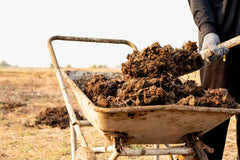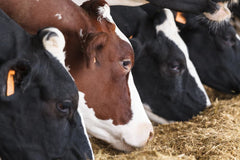All You Need to Know About Cattle Manure Management
Manure management for your livestock can have positive effects on farm productivity. For instance, manure management is one of the most essential variables to consider in any fly control effort.
As long as flies exist around your cattle, they will be able to bother your livestock, which can cause significant problems. And manure is the largest single source of things that flies want and need to stay alive. That's why getting rid of manure (and the flies that come with it) can do a lot to create a healthier, more productive livestock population.
Keep reading to learn more about how you can implement a robust manure management process in your operation.
Table of Contents
Manure Management: What To Do With It
- Moving It
- Composting It
- Drying It
- Stopping Flies From Breeding in Manure
Manure Management: What To Do With It
If you want to control flies among your cattle (and you do!), controlling the cattle's manure should be part of the process. You can control manure in several different ways, such as by:
Moving It

Flies need quick, easy access to manure to lay their eggs. If you move the waste, you remove their ability to repopulate near your cattle.
Flies can generally travel no more than 1/4 mile, and they usually take at least eight days to go from egg to an adult fly (at temperatures of around 85°F). For this reason, hauling manure at least a quarter-mile away is one option for fly control.
In the summer months, you should move manure at least weekly (even daily if possible). At the very least, you could move it before new eggs have time to hatch. Doing so can significantly benefit your fly control efforts.
Composting It
Composting is another method to control manure and the flies accompanying it. During composting, manure is piled into a heap, moistened, and then left to break down through a process called thermophilic decomposition.
During thermophilic composting, manure is heated to temperatures of at least 160 degrees Fahrenheit, and is also turned regularly. Turning the manure ensures the high temperature is maintained across the entire pile. Fly eggs can't survive at these temperatures, which will prevent new generations of flies from being able to form, all while the manure continues to decompose.
Drying It
As an alternative to composting manure, you can also dry it. If manure contains less than 40% moisture, the fly's cocoon can't form properly, and that particular fly will never hatch. Running a harrow or screen drag around your pens and pastures to break up the manure into smaller, faster-drying pats is an effective way to dry (and heat) the waste quickly.
Stopping Flies With Feedthrough Products

It helps to use as many mechanisms as are safe and practicable to manage fly populations in your manure. Along with drying, composting or moving it, another method is using a feedthrough product to stop the flies from being able to reproduce in the manure in the first place.
Champion Animal Health's JustiFLY® Feedthrough should be part of your effort to combat cattle flies. JustiFLY is an insect growth regulator (IGR) larvicide. Your cattle ingest the larvicide as they eat their regular food, and eventually deposit it in their manure. The JustiFLY works to break the lifecycle of the flies by preventing healthy adults from hatching from eggs laid in treated manure.
You can watch this helpful YouTube video on fly control to learn more.
